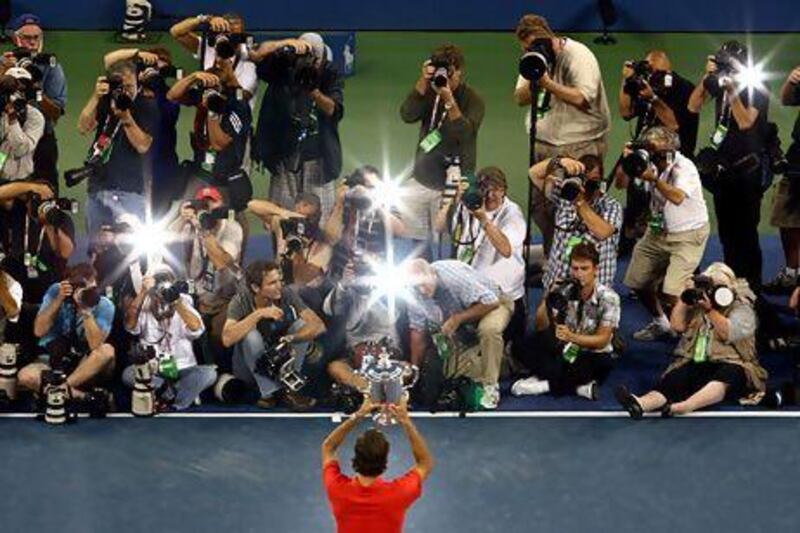The gushing eulogies have been written and shelved, awaiting the day the great man decides to call it quits. After the recent deterioration in form that has seen him drop to seventh in the ATP world rankings, it seems apparent that Roger Federer's career is nearing its final chapter.
Now he enters what could well be his last US Open as the seventh-seeded player, the first time he has been seeded outside the top four at a major in more than a decade. Potentially, he will need to beat all three of his great rivals – Novak Djokovic, Rafael Nadal and Andy Murray – if he is to add to his record of 17 grand slam titles.
On current form, there is little chance of that transpiring.
But this is Federer, the greatest tennis player of all time. If he is to have one last slam hurrah, his Rumble in the Jungle, then he is at the right place.
Recent history, particularly the performance of a quartet of American tennis legends, has shown that Flushing Meadows can be an inspiring arena for players in the final throes of their careers. Even if it doesn't lead to silverware.
John McEnroe, a native New Yorker, was well past his best when he managed to reach the semi-finals in 1990. There, he came up against Pete Sampras, all of 19. The young pretender won, and went on to claim his first major at Flushing Meadows. McEnroe would reach the last four of a Slam only once more, a loss to Andre Agassi at Wimbledon two years later.
The 1990s belonged to Sampras and Agassi. Both graced New York into the final days of their respective careers, and their epic meeting in the 2001 quarter-final is one of the greatest matches in US Open history.
Sampras overcame Agassi 6-7, 7-6, 7-6, 7-6, but lost the final to Marat Safin. It would have been a fine way to end the career of many lesser players, but not Sampras.
He returned to Arthur Ashe Stadium a year later to claim a four-set victory and another title against, who else, Agassi. It was his 14th and final grand slam win, equalling Jimmy Connors's (and later, Federer's) record of five US Open wins. It was also his last appearance on the ATP tour.
Agassi still had a few years left in him. His first great career comeback in 1998 culminated in his last triumph at the US Open a year later; but his swan song in 2006 is remembered with as much, if not more, affection.
Barely able to walk due to severe back problems, Agassi, then 36, still managed to beat Andrei Pavel in four sets, and remarkably, the eighth-seeded Marcos Baghdatis in five sets, during which his younger opponent physically fell apart.
Agassi had left too much on the court that day, however, and he lost in the third round to Benjamin Becker. At the end, an appreciative New York crowd gave him a long and loud standing ovation as he delivered an emotional retirement speech. Which brings us to perhaps the king of all Flushing Meadows feel-good stories. One which, like Agassi's, would have no big prize at the end of it, not even an appearance in the final.
For two weeks in 1991, Connors, at 39, captivated the world with a glorious route to the US Open final. Often, he literally ran himself to standstill. Every ball was chased with the enthusiasm of a teenager; every inch of the famous court was covered; every ounce of sweat seemingly given.
As a wild card, Connors dispatched Patrick McEnroe, Michiel Schapers and Karel Novacek in the first three rounds.
When the umpire made a call that went against Connors in an astonishing fourth-round win over Aaron Krickstein at Louis Armstrong Stadium, the old man of the court could restrain himself no longer.
"Get out of the chair ... You're a bum. I'm out here playing my butt off at 39 years old and you're doing that?"
It was pure theatre and the New York reaction bordered on hysterical.
In the semi-final, he lost to compatriot Jim Courier, and his appearance a year later was his last in New York. But there was no doubting who the people's champion was in the summer of 1991.
At 32, Federer is seven years younger than was Connors that day, and five years shy of Agassi's age in 2006.
A triumphant farewell remains within his capabilities. And if he doesn't win a sixth US Open title, or even reach the final, that's fine, too. We should enjoy his genius while it's still on show.
The New York crowd are sure to give him a rousing reception, and an equally loud farewell if one is required, as good as anything the American boys ever got.
After all, Flushing Meadows is were the greats walk, or limp, off into the sunset.
Follow us
[ @SprtNationalUAE ]





